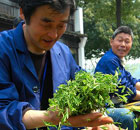Op-Ed Contributors
Villages succumb to thirst for growth
By Zhao Huanxin (China Daily)
Updated: 2010-02-25 07:52
 |
Large Medium Small |
The weeklong Spring Festival holiday I spent in my hometown, a village in central China's Hubei province, seemed to have soothed my nostalgia but also created more complications for me.
The rural area, always my escape from the fumes in Beijing's thronging streets, now is not only beset by unshakable noise, but increasingly polluted by pesticides and plastics.
I was sympathetic to my friend when I visited him and heard his gripes that his dream had been often torn by the noise from lorries and cars zipping on the expressway.
| ||||
In fact, I too was disturbed by unwelcome sounds. Years ago only rooster crows and dog barks gently woke me up in the mornings. Now horns from some boorish drivers and booming engines rudely nudge me away from the arms of Morpheus.
My village is not what it used to be. As a minute example of China's economic miracle, nearly all of the old, rusty and earthen homes have been replaced by buildings of at least two stories. Dark and dusty country roads have given way to cement ones.
Villagers can afford to buy coal and natural gas and they no longer need to cut down trees and bushes or rake in leaves for fuel. This has helped plants to thrive in the village, where owls, weasels and wild rabbits have again come back in hordes, making nests and burrows here and there.
But frogs are no longer here. Nor are the mud eels and insects I can't name that were part of my childhood and which were so abundant in the paddy rice fields. Farmers have begun to use pesticides and herbicides in recent years that increased the content of chemicals in the soil and water, virtually driving away many creatures.
What's more, the ponds and streams, once sources of drinking water for villagers, are unfit to drink, as chemicals washed from the farmland have settled in. Villagers in turn have to dig wells, but they are exposed to another peril. There have been reports throughout the country that water in some wells contains high levels of fluorine and arsenic. Here in the village there has yet to be any examination into the wells here from authorities. Villagers said they are expecting the national rural drinking water safety project, kicked off in 2006, to benefit their village.
Nationwide, one-third of Chinese townships lacked adequate drinking water by the end of 2008, which means nearly 200 million rural dwellers had difficulty in getting clean water, according to a report from Xinhua News Agency.
Between 2006-2008, governments at various levels earmarked 48.3 billion yuan ($7.1 billion) to resolve these woes by providing tap water or upgrading wells, according to statistics from the Ministry of Water Resources.
The hospitality of villagers remains unchanged. They are actually friendlier to guests - friendly in their own way, but not necessarily friendly to the environment. For hundreds of years, China's rural areas have been synonymous to poverty and dirt. A rural family, for instance, would share a mug to drink water, and even have one toothbrush for all members.
As if to show their determination to depart from those old days, farmers have changed their ways of living drastically - at least in terms of treating guests. When I visited my aunt, she used a white paper cup to serve me sweet water, and a red plastic bowl and a pair of bamboo chopsticks for dinner. They were all disposable.
From the cups and bowls littered along roads and fields in this and some other villages, I can see the "disposable" way of living that has begun to set root in China's rural regions. Waste treatment facilities are merely a luxury for farmers and those plastic wastes, difficult to decompose, are going to remain for a long time, just like the chronic dermatosis defaming the otherwise beautiful countryside.
By walking into the homes of families, I found that most of my fellow villagers are already owners of decent homes and cars, but they seemed to be still destitute in culture. Their popular pastime, for example, is to play cards or mahjong. Nine times out of ten, they play for money.
Children, on the other hand, are fond of handheld electronic games or frequent Internet bars. Rare is the scene where adults and youths are gathered around a stage to watch a show.
As development is a top priority of the local government, the village seems to be catching up with cities, but it is also mimicking the unsuccessful aspects of cities, such as pollution and noise.
The central government has decided to promote the development of the country's vast rural regions to boost consumption and further improve rural living. Now is the time to put more emphasis on environmental protection and build more cultural facilities to keep what plagues urbanites from victimizing rural residents.
E-mail: zhaohuanxin@chinadaily.com.cn
(China Daily 02/25/2010 page8)













